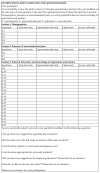Development of a Novel Pictorial Questionnaire to Assess Knowledge and Behaviour on Ergonomics and Posture as Well as Musculoskeletal Pain in University Students: Validity and Reliability
- PMID: 38338209
- PMCID: PMC10855833
- DOI: 10.3390/healthcare12030324
Development of a Novel Pictorial Questionnaire to Assess Knowledge and Behaviour on Ergonomics and Posture as Well as Musculoskeletal Pain in University Students: Validity and Reliability
Abstract
Background: Good posture is characterised by neutral spinal alignment with high physiological and biomechanical efficiency together with low stress and strain. The purpose of this study was to assess the validity and reproducibility of the adult version of the Aristegui questionnaire in university students.
Materials and methods: The study was conducted in two parts. The first part assessed content validity of the questionnaire where five experts provided their feedback on the content of the questionnaire. The second part evaluated the reliability of the questionnaire among a convenience sample of 10 university students in a test-retest study.
Results: The content validity of the questionnaire was found to be excellent. Twenty-five out of twenty-seven items had an item content validity index higher than 0.79 (appropriate) and the scale content validity index was 0.93 (high). For the reliability, almost perfect agreements were found for nine items, substantial agreement for three questions, moderate agreement for one item and fair agreement for one item. The kappa coefficients ranged from 0.00 (slight) to 1.00 (perfect) for the items on behaviour.
Conclusions: The questionnaire was found to be a valid and reliable tool to measure the university students' knowledge regarding ergonomics and posture and postural behaviour as well as prevalence of musculoskeletal pain.
Keywords: behaviour; ergonomics; knowledge; musculoskeletal; pain; posture; reliability; students; university; validity.
Conflict of interest statement
The authors declare no conflicts of interest.
Figures











Similar articles
-
Content validity and test-retest reliability of a low back pain questionnaire in Zimbabwean adolescents.Arch Physiother. 2017 Feb 28;7:3. doi: 10.1186/s40945-017-0031-y. eCollection 2017. Arch Physiother. 2017. PMID: 29340198 Free PMC article.
-
Assessment of musculoskeletal symptoms and their impacts in the adolescent population: adaptation and validation of a questionnaire.BMC Pediatr. 2014 Jul 3;14:173. doi: 10.1186/1471-2431-14-173. BMC Pediatr. 2014. PMID: 24992817 Free PMC article.
-
Reliability and validity of the Chinese version of the achievement emotions questionnaire for physical education in university students.BMC Public Health. 2023 Sep 21;23(1):1839. doi: 10.1186/s12889-023-16759-5. BMC Public Health. 2023. PMID: 37735395 Free PMC article.
-
Instrument validation process: a case study using the Paediatric Pain Knowledge and Attitudes Questionnaire.J Clin Nurs. 2016 Jun;25(11-12):1566-75. doi: 10.1111/jocn.13130. Epub 2016 Feb 3. J Clin Nurs. 2016. PMID: 26841101 Review.
-
Development of nursing students' attitudes scale toward pain assessment.Agri. 2022 Oct;34(4):245-253. doi: 10.14744/agri.2022.90018. Agri. 2022. PMID: 36300748 Review. English.
References
-
- Kim Y., Sander L.G. The Oxford Handbook of Music and the Body. Oxford University Press; Oxford, UK: 2019.
-
- Sueki D., Brechter J. Orthopedic Rehabilitation Clinical Advisor. Elsevier Health Sciences; Amsterdam, The Netherlands: 2009.
-
- Cunha A.C.V., Burke T.N., França F.J.R., Marques A.P. Effect of global posture reeducation and of static stretching on pain, range of motion, and quality of life in women with chronic neck pain: A randomized clinical trial. Clinics. 2008;63:763–770. doi: 10.1590/S1807-59322008000600010. - DOI - PMC - PubMed
LinkOut - more resources
Full Text Sources

